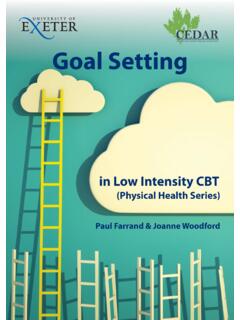Transcription of Reach out. - University of Exeter
1 1 David Richards and Mark Whyte 2011, 3rd editionReach out. National Programme Student Materials to Support the Delivery of Training for Psychological Wellbeing Practitioners Delivering Low Intensity InterventionsDavid Richards and Mark Whyte3rd edition2 David Richards and Mark Whyte 2011, 3rd editionThis publication was commissioned by the National IAPT Programme to support training courses for practitioners delivering LI interventions. It is therefore recommended for use by those courses to facilitate consistent and high quality standards across England. Preface 4 Foreword 6 A note on terminology 6 Introduction 7 The low-intensity clinical method 7 Information gathering 9 Questioning skills 10 Collecting routine outcome measures 12I1 Example interview schedule: 13initial information gatheringSummarising the information gathered 15 Information gathering in subsequent sessions 16I2 Example interview schedule: 17subsequent contactsI3 Telephone interviews 19 Information giving 22 Shared decision-making 24 Low-intensity treatment 26 interventions1 C7.
2 Clinical procedures 27 Values, policy, culture 49and diversitySupervision for 51low-intensity workingC8: Clinical procedure 53 Suggested reading 54 Appendix See note in prefaceContentsFor further copies of this publication call 0845 456 0455 or visit published in the UK by Rethink Mental Illness 2008 Reprinted by Rethink Mental Illness July 2008 Reprinted by Rethink Mental Illness August 2009, 2nd editionReprinted by Rethink Mental Illness August 2011, 3rd Mental Illness Welcome Team 0845 456 0455 Email Charity Number 271028 David Richards and Mark Whyte 2011.
3 3rd editionThe right of David Richards and Mark Whyte to be identified as the authors of this work has been asserted by them in accordance with the Copyright, Designs and Patent Act, rights reserved. This book has been produced on the condition that it shall not, by way of trade or otherwise, be lent, sold, hired out or otherwise circulated in any form binding or cover other than that in which it is published and without a similar condition including this condition being imposed on the subsequent the source is fully acknowledged, all materials in this work may be freely copied, but for teaching and clinical purposes David Richards and Mark Whyte 2011.
4 3rd editionDavid Richards is Professor of Mental Health Services Research at the University of Exeter s Mood Disorders Centre ( ). He is one of the prime movers in national and international efforts to improve access to treatment for those suffering from common emotional distress. He led the development of the Improving Access to Psychological Therapies (IAPT) curriculum for psychological wellbeing practitioners on behalf of the IAPT Workforce Team at the Department of Health. David is a vocal advocate of improving social inclusion by educating people from within their own communities to deliver low-intensity mental health care.
5 He works closely with Rethink and other mental health advocacy organisations as well as running a multi-centre research team funded by the Medical Research Council and the National Institute for Health Research which is examining new models of delivering treatment including stepped care, guided self-help and collaborative care. The results of this research programme have been fundamental to the clinical and educational methods pioneered by the IAPT demonstration site in Doncaster and now implemented Whyte was a Lecturer in Mental Health at the University of York until his retirement in 2009.
6 He has extensive experience of the design, development and delivery of mental health education programmes. He is committed to expanding access to psychological therapies for people experiencing common mental health problems and equipping practitioners with the knowledge and skills to deliver patient-centred evidence-based treatments. He taught on the Graduate Primary Care Mental Health Worker programme and the Short-term CBT course at York and, with David, played a key role in the development of the clinical model, and associated training, at the IAPT National Demonstration site in Doncaster and several IAPT wave one sites IAPT programme has been a huge collaborative effort with important contributions from very many people too numerous to mention.
7 However, we cannot let the occasion pass without acknowledging Professor Lord Richard Layard and Professor David Clark for their joint vision and tenacity in ensuring IAPT has come to fruition and James Seward in directing the programme. We would also like to thank Roslyn Hope and Graham Turpin for commissioning these materials. The materials themselves are the culmination of more than 20 years of effort in developing education programmes for people from non mental health backgrounds including practice nurses, employees of banks, NHS Direct nurse advisors and most recently graduate primary care mental health workers.
8 Sharing the journey, there have been far too many people to list individually save a few: Karina Lovell and Bob McDonald who have both been vital spirits and John Rose who has been a firm fellow importantly of all, however, we must place in the public record the contribution of Isaac Marks. More than 30 years ago, and against vociferous professional objection, Isaac originally implemented the notion of training people from diverse professional and non-professional backgrounds in the application of evidenced based psychological therapies. None of the last 20 years would have been possible without his courageous leadership and we would like to thank him for his inspiring would also like to thank the team at Rethink Mental Illness for their help in producing these materials, not least Chloe Kyle, Lauren Bourque and Natasha are also due to Della Bailey, Abi Coe, Clare Walker, Sarah Khalid and Gemma Cheney for allowing us to film their work and to Dominic Ennis and Paul Scott for their skilled camera work.
9 We would also like to thank all those who assisted as Richards, Exeter and Mark Whyte, York, August 20114 David Richards and Mark Whyte 2011, 3rd editionReach Out: Preface to the third editionDuring 2008 and 2009, the first IAPT low-intensity training courses were commissioned and began to train their first workers. The first edition of these Reach Out materials was quickly snapped up. During 2008-2009 the IAPT national team, clinical services and education providers all learnt a lot through the roll out of IAPT to 35 new sites. In 2009-2010 over 100 mental health provider organisations came on stream and a number of new courses began.
10 In 2011, the next three years of IAPT roll out began and many hundreds of new psychological wellbeing practitioners (PWPs) began to be trained. The opportunity arose to revise and reprint these materials in time for the next cohort of on previous editions from educators and students has been extremely positive about the quality and content of the materials. Many people also made very helpful suggestions as to ways in which they could be amended. As a consequence we have edited the materials to take account of these suggestions. The name Psychological Wellbeing Practitioner is now fully established and is retained in this edition.








